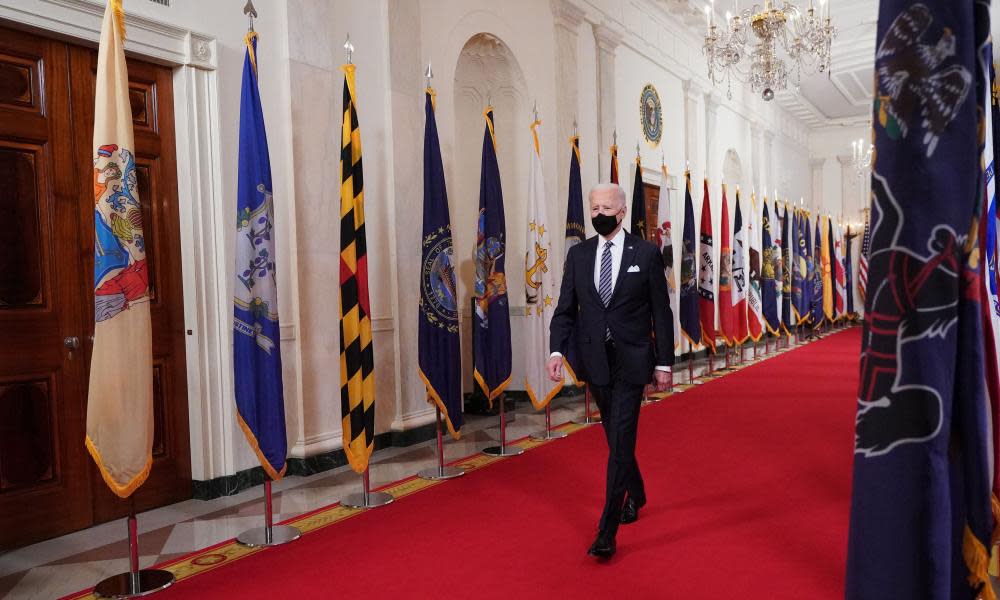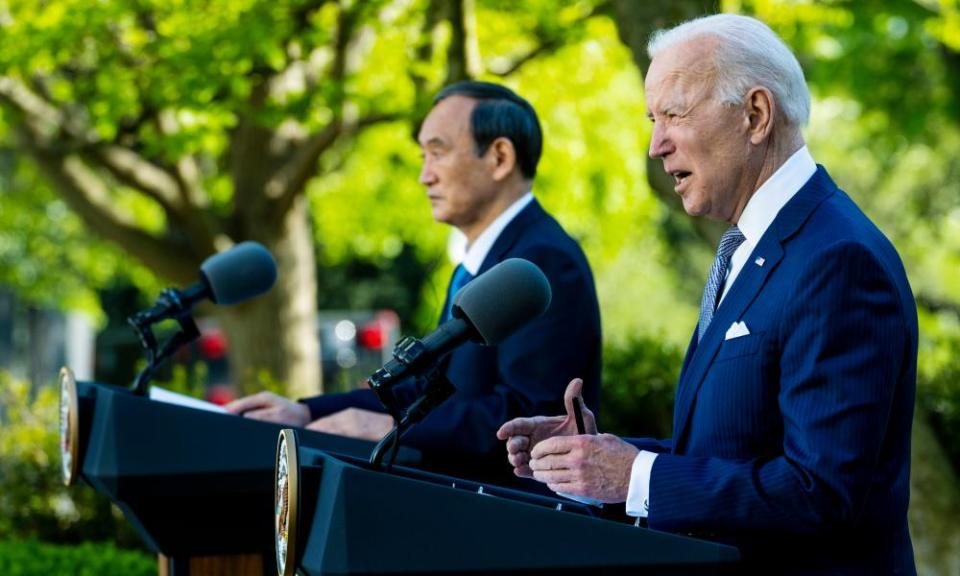‘We no longer fear the tweet’: Biden brings US back to world stage in first 100 days

- Oops!Something went wrong.Please try again later.
- Oops!Something went wrong.Please try again later.
- Oops!Something went wrong.Please try again later.
The most striking aspect of Joe Biden’s first 100 days in foreign policy is the change of style. With his emphasis on consultation with allies and partners, he is presenting himself on the world stage as the anti-Trump.
Related: Biden’s world: how key countries have reacted to the president’s first 100 days
This is what the president intends to convey with the catchphrase of his early weeks: “America is back.” With a flurry of early moves, the new administration reversed the “America first” exceptionalism of its predecessor, briskly rejoining the World Health Organization, the Paris climate accord, and the UN human rights council, while renewing the New Start arms control treaty with Russia and restarting talks aimed at reviving the nuclear deal with Iran.
Biden has personally moved to repair eastern and western partnerships, hosting the Japanese prime minister, Yoshihide Suga, as the first foreign leader to visit him in the Oval Office, and making the UK the destination of his first foreign trip, to attend June’s G7 summit in Cornwall.
“No one nation can deal with all the crises of our time alone – from terrorism to nuclear proliferation to mass migration, cybersecurity, climate change – and as we’re experiencing now, pandemics,” Biden said in his speech to Congress on Wednesday.
Jenna Ben-Yehuda, the president of the Truman National Security Project and a former state department official, said the return of diplomacy to the fore in US foreign policy has also been reflected in appointments of experienced veterans of past multilateral negotiations to high positions in the state department and national security council.
“I think that calms nerves,” Ben-Yehuda said. “I think that ‘America is back’ also means consultation. We no longer have to fear the tweet, and the erraticism under Trump that had been pretty pervasive, has been replaced with consultation.”

The emerging Biden foreign policy shows some signs of going beyond a simple Obama restoration – most notably in a clear decision to withdraw troops from Afghanistan, in marked contrast to Obama’s reluctant and abortive surge.
At the weekend, Biden took another step which Obama had shied away from, with the formal declaration that the mass killing of Armenians by Ottoman troops constituted an act of genocide.
The fury of Recep Tayyip Erdoğan, which had inhibited his predecessors, did not stop Biden, who unhesitatingly applied the same label to China’s persecution and mass incarceration of Muslim Uyghurs.
“No responsible American president can remain silent when basic human rights are violated,” Biden said on Wednesday evening. “A president has to represent the essence of our country.”
With Turkey and China, as with Russia, the Biden administration has sought to give priority to a clear stance on human rights while compartmentalising that stance from areas of common interest. It is a balancing act that many past administrations have tried with varying degrees of success – and one which the Trump administration barely attempted.
Biden has emphasised his assertive approach to China, on trade and a military presence in the Indo-Pacific, as part of a foreign policy that benefits the American class. But he has pointed to the US and China’s common interest in addressing the climate crisis, and has invited Vladimir Putin to a summit meeting in Europe to talk about strategic stability, while at the same time sanctioning Russia for the SolarWinds cyber-attack and the attempted murder and jailing of the opposition leader, Alexei Navalny.
Supporters of the administration point to this approach as proof the US does not have to sacrifice its values for its national interests in relations with major rivals and adversaries.
But some, including progressive Democrats fear that some compromises have felt too much like business as usual. The administration declassified an intelligence assessment implicating Crown Prince Mohammed bin Salman in the murder of dissident Jamal Khashoggi, but did not sanction the Saudi crown prince. Arms sales were partially maintained to Saudi Arabia and fully to the United Arab Emirates, the UAE’s human rights record in Yemen notwithstanding.
The administration also wavered on refugees, initially signalling it would maintain the ceiling of 15,000 admissions imposed by Trump, but then backtracking in the face of widespread outrage at the failure to honour a pledge to admit 62,500.
“I think the zigzagging on immigration and Russia – agreeing that Putin is a ‘killer’, sanctioning senior Russians in retaliation for cyber-attacks, warning the Kremlin because of its trop buildups on the Russian border, but then inviting Putin to the climate conference and inviting him to a summit – has been surprising, given the extremely smooth and professional rollout of other policies,” said Constanze Stelzenmüller, a senior fellow at the Brookings Institution.
“I suppose that’s what happens when policy gets mugged by reality – but it also suggests that the policy is less than fully fleshed out.”
Related: Biden’s A team: key figures pushing the president’s agenda in his first 100 days
There are also rumblings in the state department that the pledge to return to full-on diplomacy has not been matched with a commitment to career diplomats, who have so far felt shut out from the top ambassadorial positions.
“The career diplomats I’ve spoken to are starting to think there is little substance to the slogan ‘Diplomacy is back’. Unless of course it means professional diplomats will be at the back of the line for top jobs,” said Brett Bruen, director of global engagement in the Obama White House.
“It sure the heck is not what President Biden promised when he came to the state department saying that experience would be empowered and elevated. Instead, it seems as though we are headed back to business as usual, where ambassadorships are doled out as party favors to the well-to-do and well-connected.”
There is no question that the US foreign policy is back on more familiar terrain after the four years of Trump, but following exactly the same pre-Trump is no longer an option. The global landscape has changed, Russia and China are more adversarial, the US weaker by comparison, and the climate crisis has become an emergency. For Biden, it will be an uphill climb.

